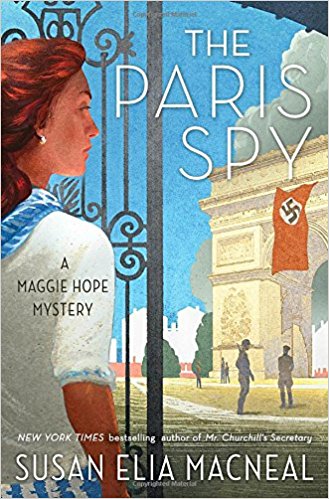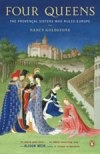 I brought this book to read on a recent family trip to Provence, but my readaholic nephew purloined it. I thought that odd, but put it off to the fact we had few books in English. Now that I’ve read Four Queens by Nancy Goldstone, I see what hooked him. This is not a book about courtly love or pomp. This book roils with war, intrigue, the crusades, and the machinations of 13th-century medieval Europe. The queens (four daughters of the Count of Provence) are almost like chess pieces, married off to forge alliances between different fiefdoms. In turn, they become the queens of England, France, Germany, and Sicily. Reminder, they are queens, not pawns, and each manages to exert influence into the politics and wars of her realm.
I brought this book to read on a recent family trip to Provence, but my readaholic nephew purloined it. I thought that odd, but put it off to the fact we had few books in English. Now that I’ve read Four Queens by Nancy Goldstone, I see what hooked him. This is not a book about courtly love or pomp. This book roils with war, intrigue, the crusades, and the machinations of 13th-century medieval Europe. The queens (four daughters of the Count of Provence) are almost like chess pieces, married off to forge alliances between different fiefdoms. In turn, they become the queens of England, France, Germany, and Sicily. Reminder, they are queens, not pawns, and each manages to exert influence into the politics and wars of her realm.
Four Queens opens in 1219 with the marriage Raymond Berenger V, Count of Provence, to Beatrice of Savoy–the parents of the four queens to be. Provence was then one of many feudal territories vying for power and was technically allied to the Holy Roman Emperor (Frederick II off in Sicily) not to the then French king. France consisted mostly just of the environs around Paris, and the ‘king’ was more of a glorified count.
In fact, Raymond’s grandfather had also been a king, Alfonso II of Aragon (in Spain), and Raymond was the first of the line to rule Provence locally rather than from Aragon. I found this fascinating that Provence had closer ties to Aragon and Barcelona than to their neighbors in Languedoc, with whom they were almost continually at war. But for a few different marriages (and perhaps the Pyrenees), Provence might have been swept up by King Ferdinand of Aragon and Isabella of Castile when they merged all of their lands into what became a unified Spain in 1492. Meanwhile, the nearby Duchy of Gascony was controlled by the English crown for most of the 13th century. This cross-pollination of feudal interests made for ongoing turf wars, which were continually redrawing political borders.
Using the marriages of the Four Queens, Goldstone traces the rise of France as an emerging power that swallowed up other fiefdoms. Raymond’s eldest daughter, Marguerite, married King Louis IX of France, but that did not stop the king from waging war against King Henry III of England, who had married her sister, Eleanor. I didn’t understand how entrenched English holdings were in France at the time—not just claims in Normandy, but also Poitiers, parts of Bordeaux, and, again, as far south as Gascony (thanks to Henry II’s wooing of Eleanor of Aquitaine in 1152). The Holy Roman Emperor and the Pope (who were by then rivals) also held claim to several vassals and territories. All the while, they were all also launching bloody Crusades into the Holy Lands.
Goldstone dishes out the schemes, betrayals, and battles like a sophisticated, real-life game of Risk. Beatrice of Savoy’s shrewd uncles became huge power brokers, masterfully playing the Pope, The Holy Roman Emperor, and the Kings of England and France, against each other. Savoy (now mostly a ski and tourist region divided between France and Italy) back then held quite the trump card. They controlled key passes in the Alps which France, Italy, and Germany needed for trade and for troop movements.

Medieval King & Queen.
Image: Clker.com
Goldstone brings to life this pivotal era as it sets the stage for the Hundred Years’ War—into which I now have new insights. She maintains a scholarly, if slightly dry, tone, weaving in details about the courtly troubadours, the lives of the Queens, and the drama of the battlefield. She also includes fun trivia such as the origin of London’s Savoy Hotel, a French queen’s cameo in Dante’s Purgatory, and the inconsequential rise of an unknown Rudolph I, the first of the Hapsburgs.
I appreciated that Goldstone highlights not only the Four Queens from Provence, but also other savvy female players of the era. Their mother, Beatrice of Savoy raised her banner men to fend off unwelcome invasion by ambitious ‘suitors’ after her husband Raymond died. She then adroitly negotiated with the Pope and Louis IX to marry her namesake daughter Beatrice to the king’s brother Charles of Anjou. Nor did she shrink from scheming against said daughter, when she felt that Beatrice and Charles usurped her interests in Provence. Henry III’s mother Isabella of Angoulème was a power hungry manipulator who even schemed against her own son. Ultimately, Isabella lost out to Louis IX’s formidable mother, Blanche of Castile, who basically orchestrated her own son’s rise to power and oversaw his consolidation of the French territories. Known as “The White Queen,” Blanche was the daughter of Alfonso VIII, King of Castile, and also a granddaughter of Eleanor of Aquitaine and Henry II of England, so she had rather imperial aspirations.
Overall, I found Four Queens engaging, readable, and very educational. While not as racy as Tudor biographies, I’d call it a must read for anyone interested in European history. As an aside, I read this right after I finished GRR Martin’s A Clash of Kings. Martin has cited the Crusades, the Hundred Years War, and the Wars of the Roses as inspirations for his books. I definitely could feel that influence reading these two books so close together.
 A few roses are starting to come in a month early this year. Though they are pink, not white, I cannot but think of that wonderful quote by Elizabeth Barrett Browning. “For if I wait … ‘till time for roses be, what glory then for me?” Here it is in the full context of the poem she wrote in honor of the early rose.
A few roses are starting to come in a month early this year. Though they are pink, not white, I cannot but think of that wonderful quote by Elizabeth Barrett Browning. “For if I wait … ‘till time for roses be, what glory then for me?” Here it is in the full context of the poem she wrote in honor of the early rose. Some word she tried to say,
Some word she tried to say,
 Has anyone else been dragging a bit this week? Perhaps it’s the five straight days of grey Dickensian mizzle, but also, I am missing the fanfare of
Has anyone else been dragging a bit this week? Perhaps it’s the five straight days of grey Dickensian mizzle, but also, I am missing the fanfare of 





